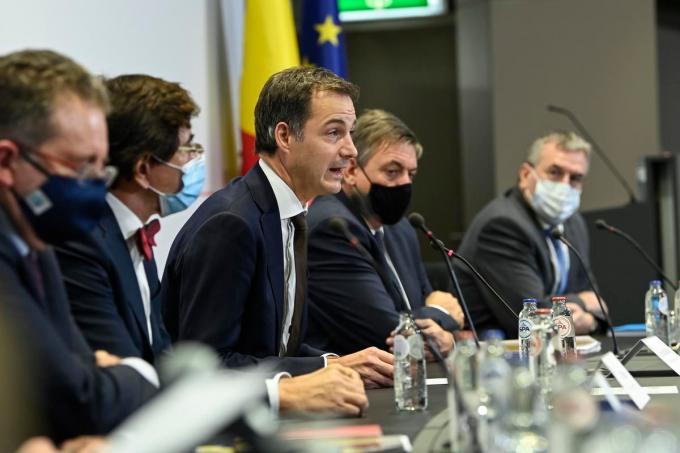Belgium is postponing a number of its planned relaxations in light of the rising coronavirus figures, announced Prime Minister Alexander De Croo during a press conference on Friday.
"It is clear that we are facing very important weeks. We can see that the number of infections and hospitals is slowly rising," said De Croo. "The increase is not entirely unexpected, as the experts had also predicted an increase. However, the increase is going faster than we expected."
"One of the reasons is that the virus has become more infectious and therefore circulates more quickly, but our behaviour has also changed," he added. "We are seeing more mobility and people are meeting up with each other more often, and are meeting more people."
"From contact analyses, we can also see that schools are key places where many infections happen," De Croo said. "Children are infected there, take the virus home, possibly infect their parents, who may infect their colleagues if they are still going to work, and so the chain continues."
"After a year of the coronavirus, we know how to deal with this situation: reduce the number of contacts. The basic message always remains the same," he said.
"We must limit our own close contacts as much as possible. If you have to meet someone, do it outside, even if you are not sick, even if you have no symptoms," De Croo added.
As a result, the so-called "outdoor plan" that was expected to take effect from the beginning of April will be put on hold. This means that outdoor cultural events with up to 50 people, and amateur contact sports with 10 people will not be allowed yet, and amusement parks cannot reopen either.
"We cannot say until when the relaxations will be postponed, because we do not want to give false hope to the population by naming a date that might not be possible," he said.
Related News
- Cheat Sheet: What relaxations have been postponed and what remains the same?
- 'These measures will be insufficient,' says Marc Van Ranst
During the Easter holidays, outdoor youth activities (for people up to 18 years old) will still be possible with a maximum of ten people, without overnight stays. For children under 12, activities will preferably take place outdoors.
The number of seats on trains to tourist destinations (such as the coast) will be limited. Only window seats may be used on trains, with the exception of children under 12 years of age. This measure does not apply on school days.
"We are doing this because we want to keep the perspective for after the Easter holidays," he said. "We still want to be able to open the schools on 19 April."
By Monday 22 March, the different education ministers have been asked to come up with a plan to ensure that as few infections as possible occur in schools.
"As far as companies are concerned, it is very clear: teleworking is not a luxury, teleworking is an obligation," De Croo said. For employees who cannot telework, a thorough system with rapid tests will be introduced starting from Monday.
"The coronavirus pandemic is not over, as much as I would like it to be," said De Croo. "Our task is to adapt our social contact in such a way that we infect fewer people. So we can keep perspective to open the schools, and resume some activities on 1 May, such as reopening the hospitality industry."
"We absolutely want schools to be able to open on 19 April, and we want them to stay open. Just as we want the hospitality industry to be able to open on 1 May, and to remain open," added Federal Health Minister Frank Vandenbroucke.
"If we want to succeed in this, we will have to be very careful between now and the Easter holidays, and take the necessary measures very quickly and firmly," he said.
"We are seeing a growing number of infections and hospital admissions, and more patients in intensive care too," Vandenbroucke said.
"The situation is not good, and it brings with it the risk that we would not be able to open the schools after the Easter holidays, and not be able to open the cafes and restaurants on 1 May," he added. "We all know the rules: we have to stick to them."
"We must act forcefully in the coming days, and all of us will have to be particularly careful now," Vandenbroucke said. "The governments will have to act quickly and forcefully, this is undoubtedly not our last rendezvous."
Update: This article was updated to specify that contact sports will not be allowed yet from 1 April, following clarification in the Ministerial Decree published on Sunday.
Maïthé Chini
The Brussels Times

